#Zuko is the perfect example of the main character because he won
Explore tagged Tumblr posts
Text
Aang is a perfect example of “they won because they are the main character” instead of “they’re the main character because they won”. No, I will not elaborate.
#in other news#Zuko is the perfect example of the main character because he won#atla#avatar the last airbender#anti aang#aang critical#atla critical#avatar the last airbender critical
276 notes
·
View notes
Text
Yup, Sure Was a Finale
I had an epiphany. The reason why I never re-watched the final two parts of Sozin’s Comet even though I’ve popped in episodes at random many times over the years isn’t that I can’t bear the sadness of seeing one of the best, most engaging narratives out there come to an end.
It’s simply that the finale isn’t all that good.
Some honorable mentions of what was enjoyable.
(+) This
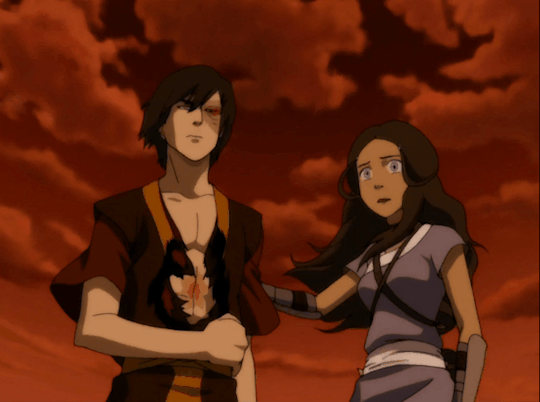
Just this.
(+) The Church of Zutara has another convert
“Are you sure they don’t get together?” Hubster, 2020
(+) The tragedy of Azula
And the fact that it’s acknowledged as such. I hope Zuko will do his best to get her help and have a relationship with her…
(+) Sokka being a big bro
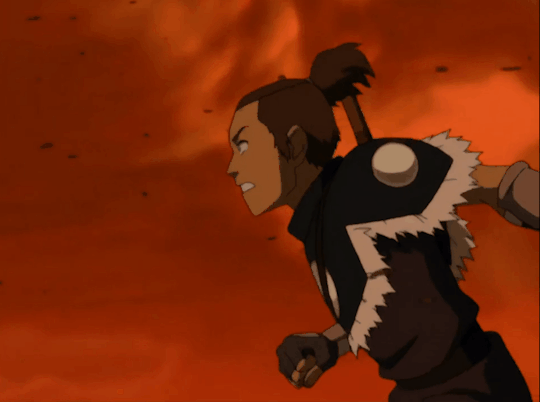
And the whole airship sequence in general. It’s wonderfully paced and plotted, with moments of humor, real stakes, Toph being both badass and a scared crying kid, Sokka strategizing and protecting, Suki saving the day, and non-benders being instrumental in thwarting the bad guy firebender’s plans. Would be shame if Bryke never portrayed them this capable ever again…
And now for the main course.
(-) Blink and its over
The wrap-up feels too quick (hashtag Needs More ROtK-style False Endings). A part of this is due to how fast the story goes from the thick of the action to hastily tying up a bunch of loose ends, but the larger issue is how Book 3’s uneven pacing comes home to roost. After spending half a season on filler episodes that at best subtly flesh out established characters while dancing around a huge lionturtle-shaped hole, and at worst contradict the theme of “no one is born bad” with “you’re a hot mess because your great-grandfathers didn’t get along too well”, the frantic “go go go” rush of the second half screeches to a halt with “they won and everyone was happy because now the right people have power and it will be all good from now on yup nothing more to deal with baiiiii”.
Yes, I know, it’s a kids’ show. But goddamn, this particular kids’ show has proven so many times it can do better than the expected tropiness. Showing the characters in their roles as builders of a new world was the least that could have been done.

Oh well!
(-) Ursa
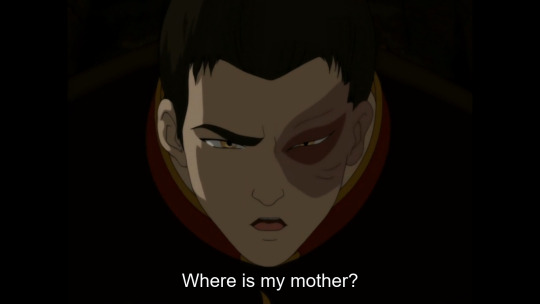
We’ll never know. There will never be a story that delves into this. Yup. Shall forever remain but an intriguing mystery. Is good, though. Mystery is better than a story where Ursa shares her son’s penchant for forgetfulness. Imagine how embarrassing that would be. Speaking of which…
(-) What does Mai see in this jerkbender?
Look, I like to harp a lot on the mess of inconsistent writing that’s Mai but let’s unpack this scene from her perspective, shall we?
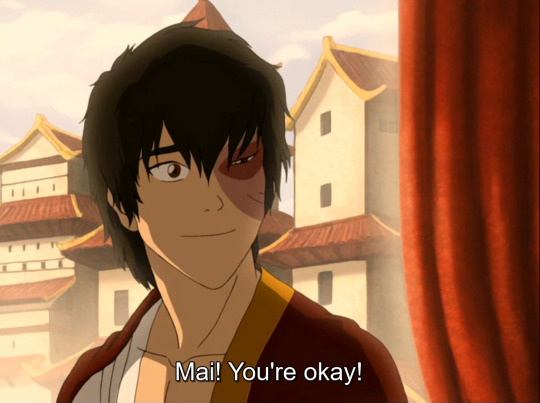
Zuko forgot about her! It totally slipped his mind that the one person who prioritized the safety of his dumb ass was rotting in the worst prison in the Fire Nation—because of him! And she was rotting there long enough after the final Agni Kai for the news of Zuko’s upcoming coronation to spread and her uncle to feel sufficiently secure to release her. But then the coronation scene is attended by every single member of Gaang & Friends that was imprisoned?
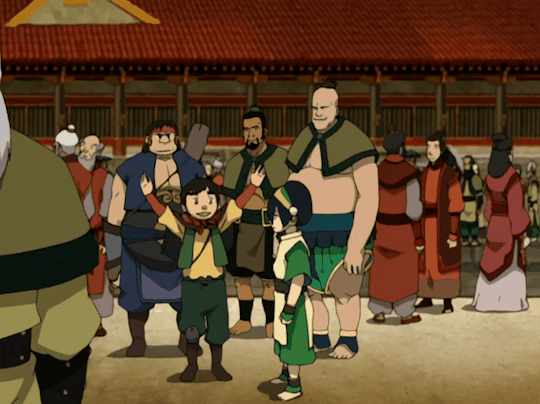
So what this tells me is that either a) the invasion force had the ability to break themselves out the whole time and for some reason decided not to exercise it until after the war was over, b) Zuko forgot about them as well and no one thought to remind him there were prisons full of POWs until Mai arrived, or, and that’s even better, c) Zuko took care to free every single resistance fighter while making sure Mai would be the one to stay behind bars.
Never thought I’d say this but Mai? Honey? You deserve so much better.
(-) “What does Katara want?”
Asked no one in the writers’ room ever, apparently.

This is not so much anti Cataang as anti romance stories that pay attention to the needs, opinions, and wants of only one partner in general. Over the previous 60 episodes, Katara actively expressed romantic interest in Aang exactly, wait for it,
Once.

And it got retconned out of relevance by the following two interactions where the possibility of a romantic relationship came up, making the Headband dance pretty easy to reclassify as just one of those examples where Aang “teaches” Katara to have fun (as if one of the main obstacles to her having fun wasn’t him constantly fooling around and offloading his duties). And because the writers not only didn’t succeed in portraying Katara’s internal state of mind, but also failed to root her reluctance to pursue a relationship in outside circumstances that could change, her sudden state of unconfused once Aang steps into the spotlight has a single canonical explanation that as much as approaches coherency.

The fact is, though, that trying to interpret canon Cataang from a Watsonian perspective is an exercise in foolishness. Because there is no Watsonian justification for the ship and never has been. Bryke simply conceived of Katara as nothing but a tropey prize for Aang, never saw her as anything beyond that, and were perfectly happy to go on and immortalize her as a passive broodmare for the rest of her life.
And I fully intend to die mad about it.
(-) Iroh dips
OK, it’s been long apparent that the show doesn’t intend to do anything about Iroh’s complicity in AzulOzai’s regime in any meaningful way, and that his sole motivation for doing anything whatsoever is Zuko whom he views as a replacement son which is supposed to be good for some reason. But the finale has him abandon even that, and instead turns him full-on YOLO, idgaf anymore. It really throws Iroh’s supposed love for Zuko into doubt when his last act in the entire show is to take a half-educated 16-year old with no political savvy or an heir to secure a dynastic continuity and plomp him on the throne of a war-mongering imperialist regime where the entirety of the militarist and ruling class is guaranteed to fight him tooth and nail for power.

(I sure hope Mai’s ready to start popping out babies by tea-time otherwise the whole country is fukd in about a week)
Christ, how hard would it be to have Iroh keep the throne warm for a few years while Zuko is getting ready to succeed him? Not only would it make the whole FN reformation bit quite likelier to occur, it would require Iroh’s hedonistic ass to actually sacrifice something for once. And not having Zuko ascend to power, instead spending some time bettering and educating himself first, would be a wonderful message that no matter what you endured and overcame, you never stop growing. A kids’ show, remember?
(-) The conquering of Ba Sing Se
Gee, I feel so blessed to have my attention diverted from battlefields which actually matter to an old dude vanity project I would have been perfectly happy to assume resolved itself off-screen.
The White Lotus in general just bugs me. I was fine with the individual characters and their overall passivity when they were portrayed as lone dissenters living under circumstances where it wasn’t really possible for any single person to mount a meaningful resistance. But as members of a far-reaching shadowy organization that’s left the real fight to a bunch of kids for 59 episodes straight and didn’t turn up until a perfect opportunity presented itself to take control of the largest city in the world and bask in the spotlight?
Yeah, no.
Similarly to the lionturtle-ex-machina, the White Lotus represents a huge missed opportunity for a season-long storytelling. Here’s just a brief list of what they could have been doing throughout Book 3:
orchestrating a Fire Nation uprising;
gathering those directly persecuted by AzulOzai’s regime to help Zuko keep his hold on power once he’s crowned;
establishing themselves as a viable alternative to Ozai;
sabotaging Fire Nation’s war efforts from the inside;
countering Fire Nation propaganda (Asha Greyjoy’s pinecones, anyone?);
running a supply network to alleviate the suffering of Earth Kingdom citizens.
Instead, they sit on their asses until the time comes to claim personal glory.
You know what, good on Bryke for making me conclude that in comparison, the Freedom Fighters were perfectly unproblematic, actually.
(-) Fire Lord Dead-by-Dawn
Yes, a kids’ show, I know! But ffs, this is the same kids’ show that came up with Long Feng and portrayed courtly intrigue, kingly puppets, secret police, spy networks, and information wars. Was it really too much of me to expect something other than “enlightened despot solves everything”? Especially if said enlightened despot has persisting anger issues, no personal support system, no base of followers, and no political experience whatsoever?
If Zuko’s actually serious about regaining the Fire Nation’s honor (i.e. by dismantling the country’s military machine, decolonizing the Earth Kingdom, paying reparations to everyone and their lemur, and funding any and all cultural restoration projects Aang and the SWT come up with), then there is no way, no way in the universe that he doesn’t face a civil war, deposing, and execution within a month.
One reason why his future as a Fire Lord seems rather bleak is that little’s been shown about the actual subjects of AzulOzai’s regime. While we get a vague reassurance that “no Toph, they’re not born bad” (le shockings), they largely remain a voiceless uniform mass of brainwashed clapping seals. What is their view on the Fire Nation’s crimes? Do they associate their condition with their country’s war-mongering? How will they react when Zuko starts dismantling the country piece by piece to rebuild it, bringing it to economic ruin? What will they do when noble Ozai loyalists come out of the woodwork and begin rounding them up under the banner of “Make the Fire Nation Great Again?”
I have no idea, and Zuko doesn’t either because he’s unironically more qualified to rule the Earth Kingdom than his own people.
You know what would have been better? Fire Lord Iroh, White Lotus pulling the strings to maintain the regime, and Crown Prince/People’s Champion Zuko travelling the Fire Nation with Aang and an army of tutors to promote the new boss, only to realize that absolute monarchy is kinda crap for the people he’s one day supposed to rule and gaining their support by ceding some power to them.
I’d laser holes into my TV due to how much I’d enjoy watching that.
(-) All hail Avatar Rock
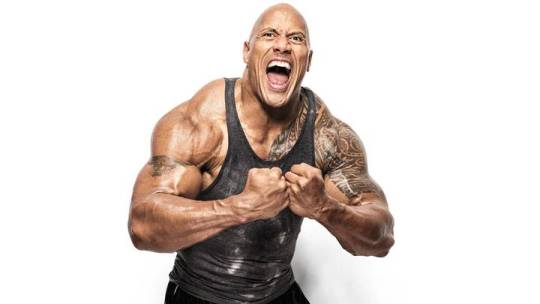
Literally and metaphorically. Aang doesn’t sacrifice anything, gets everything, and the clever solution of going about getting said everything is handed to him on a silver platter, requiring no active participation on his part whatsoever.
He doesn’t work to unblock his chakras, spiritually or physically.
He only speaks to his past lives to get a pat on the back and a bow-tied solution he could mindlessly follow.
Energy-bending doesn’t require any sacrifice from him, leaves no lasting marks, and only serves for the narrative to praise him as the rare individual that’s unbendable and thus so very very special.
The most infuriating thing is, however, that Aang is clearly shown as being able to beat Ozai without either the Avatar state, or energy-bending.
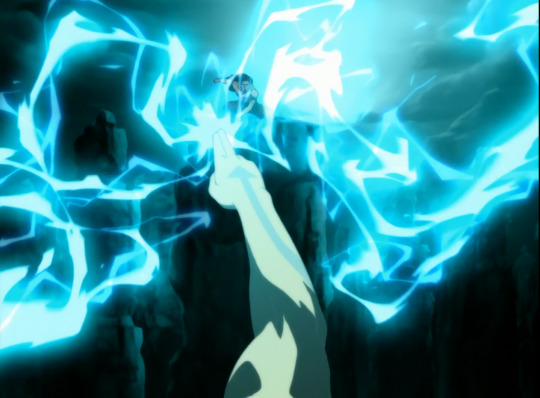
And he chooses not to. From this moment on, Aang no longer fights to save the world. He fights to preserve his beliefs, going directly against the instructions of his past lives and effectively reneging on his duties as the Avatar.
Again.
It’s not like you can’t portray Aang’s faithfulness to his spiritual beliefs as the key to beating Ozai and saving the world. But that’s not what the show did. There is no link between Aang sparing Ozai and securing a better future, quite to the contrary—Ozai’s survival ends up being a massive problem for the continuation of Zuko’s rule, and consequently a threat to the world at large. His survival benefits Aang and no one else.
Aang’s spiritual purity and his status as a savior of the world are allowed to coexist only due to a deliberate stroke of a writer’s pen.
And I hate it.
Welp, nothing to do about it now except to bury myself up to my tits in fix-it fics I guess.
736 notes
·
View notes
Text
On Writing: Mentor Characters
Mentor characters are common. We all know this. They’re more common in sci fi and fantasy but not limited to those genres. Everyone could use good advice sometimes! Soo here we’re going to talk about a few tips on writing mentor characters well.
(I mean....this post mostly talks about Avatar. Nobody should be surprised at this point.)
Your mentor should be flawed.
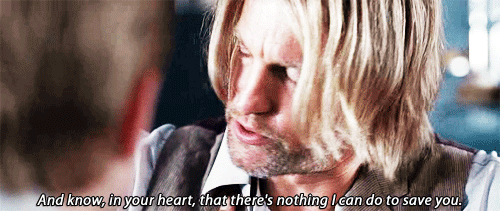
Every character is more interesting and engaging when they’re flawed - the mentor is no exception. The wise old sage who’s perfectly wise and zen and knows everything about everything is boring. You might as well just give your main character a manual and send them on their way. Or just send the mentor to do the protagonist’s job for them.
Gandalf is old, tough and wise, but he has a temper (rip Pippin) and he’s incapable of taking the Ring to Mordor. He’s already tempted by the draw of the Ring’s power; this is a flaw he recognises and it’s why he tells Frodo he can’t take the Ring himself. To some, Gandalf might be an example of the generic old wizard who knows everything (and fair enough) but he’s not perfect, and there’s a reason he can’t complete the quest.
Haymitch from The Hunger Games is an alcoholic; he’s rude and cynical and seems to be fairly unsympathetic towards Katniss and Peeta’s fate. This is because he’s learned not to grow attached to his pupils. They inevitably die in the arena. Haymitch has become the way he is as a result of his trauma; despite his current self, he won his own Games through resourcefulness and determination. He and Katniss have more in common than he would first let on. Underneath his hard exterior are the lessons he teaches Katniss and Peeta.
What does the mentor pass on to the protagonist?

Any generic mentor in a big cloak can teach the protagonist the Lessons of the Magic Thing or something else they need to learn. What’s more interesting is adding a personal element to what the mentor teaches the protagonist; how did they learn these lessons themselves?
In Avatar: TLA, though Iroh does teach Zuko lightning-bending, most of the lessons he teaches him are life lessons. Iroh teaches Zuko that he alone can control his destiny, and that his honour can only come from his own actions and not what his abusive father thinks of him.
Iroh has learned this through his own experiences; he once had his own notions of what honour and power were and his priorities were to help the Fire Nation prosper in the 100 year war, specifically to conquer Ba Sing Se. These things stop being important to him when his son is killed in battle. He returns home a failure, loses out on the throne to his younger brother and is viewed by a lot of people as a silly, lazy old man (sometimes even by Zuko himself). But he’s learned from his experience, and when he returns to conquer Ba Sing Se it’s for the Avatar, not the Fire Nation. Iroh once believed the Lie spread by the Fire Nation, and now he’s trying to teach Zuko the Truth behind the Lie.
Another example is Tony and Peter in the MCU, aka Iron Man and Spider-Man. In Iron Man 3, Tony spends time conflicted over what exactly makes him Iron Man. Who is he without his suit? Eventually he realises that the suit may be important, but Iron Man wouldn’t exist without Tony. In Spider-Man: Homecoming, he teaches this lesson to Peter, albeit harshly, by taking his suit away from him. He learns to live without it and see what truly makes Spider-Man isn’t the suit, but the person inside it.
“If you’re nothing without this suit, then you shouldn’t have it.”
The mentor’s lessons should represent something.
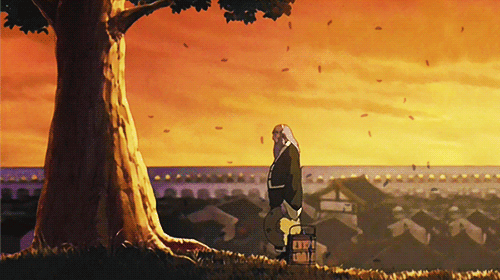
When writing a wise old mentor who knows all the Important Things, they should know (and represent) a thematic Truth of the story. If the protagonist believes a Lie about themselves and/or the world they live in, the mentor has to show them the Truth of the world (and the narrative).
We’re talking about Iroh and Zuko again! The episode “The Avatar and the Fire Lord” explores this idea twice; with Zuko and Iroh and with Aang and Roku. Iroh tells Zuko that he must understand the story of his great-grandfather’s demise to understand his own destiny. Similarly, Roku tells Aang that he must understand how the war started to understand how to end it.
The two lessons are connected to the story of Roku and his closest friend, Fire Lord Sozin, and the themes of morality and balance. Balance is a massive theme in Avatar. Bringing balance to the world is the Avatar’s duty; imbalance means chaos and destruction, while balance means peace and prosperity. Mastering the four elements (and what they represent spiritually) is the key to bringing balance to the nations.
Zuko doesn’t understand the significance of his great-grandfather Sozin’s story, until Iroh tells him that Roku was his great-grandfather as well, and that the conflict of these two men, and the war that followed, are an integral part of him.
“Evil and good are always at war inside you, Zuko. It is your nature, your legacy. [...] Because of your legacy, you alone can cleanse the sins of our family and the Fire Nation. Born in you, along with all the strife, is the power to restore balance to the world.”
This represents a big question asked by Avatar; is anyone truly evil or truly good, and what does it mean to balance these elements inside you? Aang asks himself the same question. His friends see Sozin betraying Roku as a sign of Sozin’s evil nature. Aang sees it as a lesson that anyone is capable of great good or great evil. Roku was born in the Fire Nation, just like Sozin, and like Zuko. And it doesn’t define who they are as people.
Give your mentor an arc.

While obviously your main character’s arc should be the most detailed and most relevant to the story, that doesn't mean other characters shouldn’t develop and have an arc as well. Your mentor is no exception. When it comes to characters that can more easily fall into stereotypes (a love interest is another example; they definitely need an arc as well) an arc is a perfect way to make them feel more original.
A common arc is the cynical, withdrawn mentor picking their sword (or whatever it is) back up and joining in the fight they’d closed themselves off from, or learning to be happy again thanks to their relationship with the protagonist. It’s basic, but it’s an arc nonetheless.
A specific example of a mentor’s character arc is Tenzin’s in The Legend of Korra. Tenzin is Korra’s airbending master and primary mentor; he’s also the son of the previous Avatar. To top it off, he has the responsibility of mentoring his children as a father and a teacher to the last airbenders of the world. These roles combined put massive pressure on Tenzin and his struggles when it comes to connecting with spirits and the spirit world. His inability to connect to the spirits makes him feel like a failure trapped in Aang’s shadow. Tenzin only overcomes this obstacle when he realises that he is not his father, that he can only be himself, and this brings him the spiritual enlightenment he’d been missing all along. He’s more than a manual for Korra; he’s a character with his own struggles to overcome.
The disappearing act.
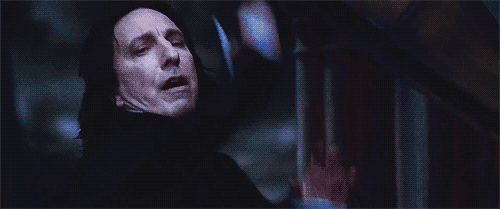
Why do mentors always die?
The reasons are pretty simple; we need the protagonist to make their own choices without a teacher. We need to see how they stand up to whatever their obstacle is without help. We need to see how they implement the lessons they’ve learned from the mentor.
Even with all these valid reasons, the death of the mentor can feel stale and overdone because it’s so common. Adding further plot relevance to the death of the mentor can make it more meaningful. It shouldn't just be so the protagonist has to make their own way. The mentor doesn’t have to die either. They can simply go off somewhere for a while; Gandalf just fucks off whenever he pleases because Tolkien needed the other characters to manage without him. His death does add higher stakes to the story, though.
Iroh doesn’t die, but his disappearing act is a result of Zuko betraying him. Zuko returns to his sister’s side and Iroh is locked away in prison. This is powerful because Zuko has to deal with the guilt of betraying his uncle, while also learning to make up his own mind about his destiny without Iroh’s help.
Another effective tool in making a mentor’s disappearing act more meaningful is the post-disappearance narrative. After Dumbledore’s death, Harry learns a lot more about him than he knew when he was alive, a lot of which is a little uncomfortable to hear. It’s difficult to process such truths about a man he was sure he knew well, and adds more impact to his absence.
SPOILERS FOR FFH Similarly in Spider-Man: Far From Home, Peter doesn’t realise how flawed Tony was until after his death. He realises he can’t live up to the image of Iron Man, but not even Tony himself could live up to the heroic image. Happy Hogan tells him as much; that Tony was a mess and couldn’t live up to his own legacy anymore than Peter can. SPOILERS FOR FFH
So, there you have it! Now go flesh out your manuals~
#writeblr#writers of tumblr#writing advice#characters#violetvineyard#mentors#character death#writing tips#writing wednesday#ffh spoilers
3K notes
·
View notes
Text
Reblogging myself to add these here because this is ALSO an excellent point


The reason I said Catra should have died in season 4 is not because she did horrible things. The reason I feel she should have died is because that was the logical progression of her character based on 3 entire seasons of build up or in her case regression. And by season 3 she hits a crescendo where I was like "there is no coming back from this" And even if you try and redeem her, one season is not enough to undo her broken psyche, even if it was enough to fix the actions she'd physically done. Adora would have been willing to do that. But Catra's mental state was WAY too broken by the end of season 4 for a hug and a kiss to flip her psychology a complete 180. Not to mention fucking GLIMMER got an entire season of backlash from Bow for her bad decisions in season 3 and RIGHTFULLY SO but when Adora says Catra is one of the good guys now, Bow is like "Yay! A new friend!"
UH...... EXCUSE ME?????
It's all just wrong for a forced romantic ending that stole all its visuals from the Utena finale without any of the depth or build up and I'm starting to wonder if the only reason the creator called it a "tribute" is because they didn't bank on the fans of the show recognising the scene the way they did and when they tweeted at her how much they loved the Utena Tribute she went "yeeeaaah...... tribute..... that's what it was!"
But that's bordering on a conspiracy theory.
I forgot ATLA exists but this is a PERFECT example of how the things Zuko did and the horrible actions he made, ALSO rooted in trauma, were not hugged away when he cried about his dad's abuse to the main characters without having to make a single move to fix anything or even apologise for anything.
Zuko has episode upon episode upon EPISODE of him trying to FIX what he did. Literally begging people for forgiveness for his actions and acknowledging how terrible his choices had been. Not to mention at some point in the story HE WON. He GOT what he wanted. He got to come home and bask in his victory.... and he did not like it because it felt wrong. And he ABANDONED that victory to instead try and atone for his actions. And guess what? NOT EVERYONE FORGAVE HIM. There's literally an entire episode where he befriends a family from the Earth kingdom, and the second they find out he's from the fire nation? Not even the prince just a MEMBER of the fire nation? They kick him out and run him out of town. Angry and full of hate for him. And he doesn't try and change their minds or justify his actions to them.
And comparing him with Azula is ALSO a good point. They both made their decisions and choices. And even Zuko, who in the end became Aang's strongest ally, was never absolved of the hurt he'd caused. Instead, he fully acknowledged them, and worked towards fixing his own mistakes. Some people forgave him but these people were either his family like Iroh or the Gaang who ONLY did so because Aang was willing to do so and Aang is.... you know... literally a Buddha 😂
And yes. Aang had a crises on the whole "should I kill the firelord" and I am NEVER gonna be one of those people who completely missed the point and go "he should have killed the firelord. He was being selfish not doing so". Aang made the right choice. But he didn't let the firelord go back to ruling the Fire Nation and promise not to invade any more. He took away his bending powers and tossed him in a prison for the rest of his life.
Anyway this is a lot of text just to say "you right tho"
One thing that will probably annoy me for a long time until it stops being a trend is how Steven Universe taught a lot of young writers and animators how to write objectively horrible people and convinced them that this is how you write ✧・゚: *✧・゚:* Complex Characters*:・゚✧*:・゚✧ Leading to a trend of main characters in stories being absolutely awful and who do nothing but hurt others and treat other characters like dirt in narratives that reward them for it and never call them out.
217 notes
·
View notes
Text
I know it’s been said before, but one thing that makes the story of Avatar so beautiful, but also tragic is that this is a full-blown war they’re in. So many kids shows are the perfect example of the big good vs evil trope they’ve got going on, but in Avatar, these kids are living in a world that’s torn apart by war.
And the only one who can save it, is the one who was born in the time of peace.
But the war adds complexity of the story. It is still good vs evil, but balance more important. The Fire Nation is the enemy, and there’s no if or buts about it, the Fire Nation is the enemy. There’s not one moment of “oh boy, that Ozai isn’t that bad, he must have good intentions”.
Even though the Fire Nation is the “bad guy” without a doubt, a war makes the whole good vs evil thing different. Characters like General Fong and Hama show us how much war can corrupt people, even those on the “good side”. General Fong is so convinced that his ways of fighting the war are right, that he puts Aang’s emotional well-being on the line. Hama started out as someone fighting the bad guys, but years of war have turned her into something truely distrubing. I mean, she’s from the “good side” and the kidnaps people from the “bad side” so that they can rot away in a cave. And even though she’s from the Good Water Tribe and she attacks the Bad Fire Nation, she’s obviously the bad guy.
There are more of these moments where Team Avatar ends up helping the Bad Fire Nation. Aang gives Tom-Tom back to his Fire Nation superiors of a parents, Katara saves an entire Fire Nation village, Aang befriends his school friends in the Fire Nation, Sokka evacuates an entire Fire Nation village... Because that’s another part of the world of Avatar. Every nation is affected by this war.
The entire Air Normad has been brutally murdered. Not many kids shows handle actual genocide, and the moment where Aang realises that he really is the last one and that all of his people have been killed, is one of the strongest moments in the show. The Earth Kingdom has been plagued by poverty and it turns out that the capital is one big propoganda city where the king of the Earth Kingdom doesn’t even know there’s a bloody 100 year old war. The Water Tribes are so far away from each other that the Southern Water Tribe is barely populated and the Northern Water Tribe can’t help them, since they don’t know enough of the enemy.
Even the Fire Nation isn’t bad. The Fire Nation isn’t a big glory nation. People die from poverty, people are hurt, and the people who are well off are taught that they need to continue this war to spread the Fire Nation’s wealth. Zuko said it himself. He was taught to believe that his nation was invincible, but after being on his own, he realises how much innocent people have been hurt by the war, and he realises he’s been lied to. There are obviously Fire Nation citizens who strongly believe in Ozai and obey him and bla bla, but the most part of the Nation consists of innocent civilians.
Which is the worst of it. People die. People get hurt. Not to mention that kids die in a kids tv show. Kids are also victims of this war. Many kids show portray the war as something awful, but the adults handle it.
Not this show. Families are torn apart because of this war. Katara and Sokka lost their mother and their father is always out fighting. Haru gets imprisoned. Yue and Jet die. These are all kids. Kids die on a tv show. Kids who were friends with the main characters, who also had friends and family besides them, who had storylines and background and depth. And they died. You can even say that the Royal Fire Nation family is victim of the war, since Ursa was banished, Zuko was abused, and Azula slipped into insanity.
In the end, there’s peace, but as Avatar: the Legend of Korra has shown, that doesn’t last forever. But that isn’t exactly the point of Avatar. It isn’t: “We’ve won and it’ll never go bad again. The good guys are defeated!”, instead it is: “Problems will always happen, but in the end, balance will be restored!”
I can continue writing about this show, but that’ll take forever. Avatar is one of the best shows in the world, and this is one of the many reasons.
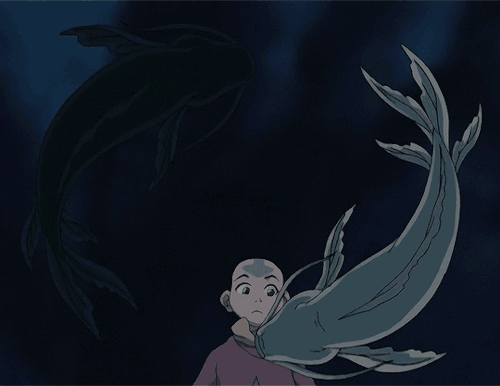
73 notes
·
View notes
Text
no need to elaborate, it's a syndrome that so many main characters suffer from 😩
Aang is a perfect example of “they won because they are the main character” instead of “they’re the main character because they won”. No, I will not elaborate.
#in other news#Zuko is the perfect example of the main character because he won#atla#avatar the last airbender#anti aang#aang critical#atla critical#avatar the last airbender critical#<< prev tags
276 notes
·
View notes